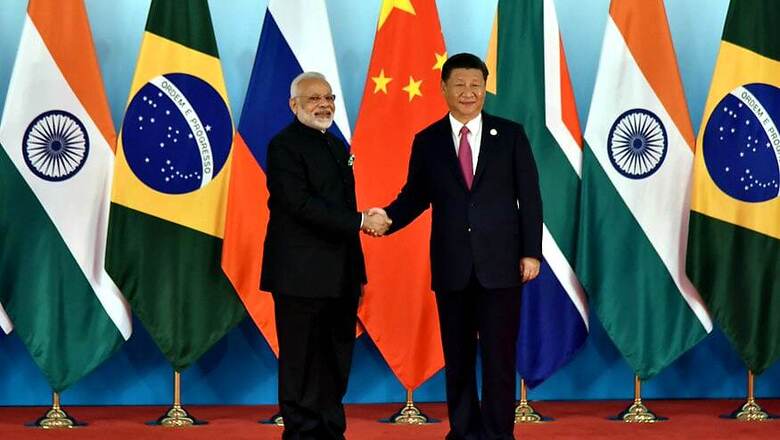
views
Xiamen: It's been an extremely successful week for Indian diplomacy. They say a week is a long time in politics. The same can be said of the last week in diplomacy. Last Monday, on August 28, India managed to successfully resolve the two-month old standoff with China at Doklam. Exactly a week later, on September 4, India managed to name Pakistan-based terror groups like the Lashkar-e-Taiba and Jaish-e-Mohammad in the BRICS Joint Declaration.
Both these developments will be seen as breakthroughs for Indian diplomats who have often faced immense difficulty while negotiating with China. Just in the last one year, India has been snubbed by China on both the NSG membership issue as well as on Masood Azhar, the chief of the Jaish-e-Mohammad. So let's take a moment to pause and reflect on how both these successes were brought about.
At Monday's press conference, a question was asked to MEA Secretary Preeti Saran on whether there was a quid pro quo between what happened in Doklam and the BRICS Joint Declaration. She dismissed it as a wild speculation. But informed sources have told News 18 that it would be disingenuous to see the two incidents in isolation. Much of the negotiations for the draft of the joint declaration happened while the Doklam standoff was on. It would be naive to assume that the standoff would not have cast a shadow on the negotiation process.
News 18 has also independently learnt that negotiators worked till late in the night on Saturday, before the start of the BRICS summit to get the exact phraseology. Negotiations went on up to 4 am with the Chinese raising obstacles at every stage.
So what explains this dramatic turnaround? Most foreign policies are dictated by domestic compulsions, as much in China as it is in India. The biggest domestic policy event that is slated in China is the 19th Party Congress of the Communist Party of China on October 18, will pave the way for Xi Jinping to get a second term as President. The Chinese could ill-afford an unsuccessful BRICS Summit in Xiamen ahead of the Congress as it would be a personal 'loss of face' for President Xi Jinping.
Also, China faced the same problem in Xiamen that India faced in Goa last year — pressure of being the host. As host, the onus is on China to find a consensual joint declaration that can be adopted. The host has to walk the extra mile. Therefore the host's scope for taking extreme positions in these negotiations is crippled. Part of the reason why India couldn't push through similar language in the Goa declaration was precisely because of this.
It is in this background that Prime Minister Narendra Modi will be meeting Chinese President Xi Jinping. Perhaps for the first time in a long time, as an equal. As they say in diplomacy, timing is everything.















Comments
0 comment